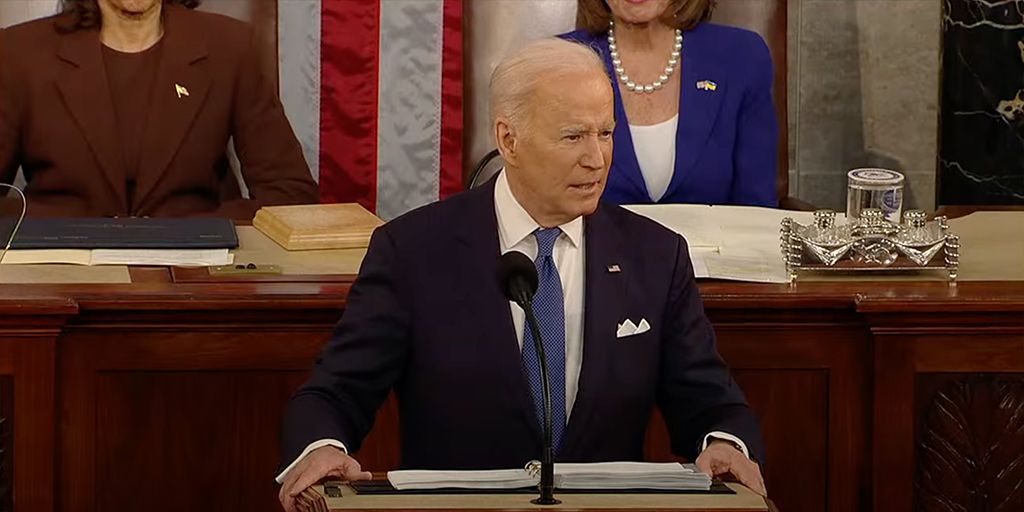March 2022 U.S. Tech Policy Roundup
Claire Carey, Alexander Hart / Apr 1, 2022Claire Carey is a senior associate and Alexander C. Hart is a vice president at Freedman Consulting, LLC, where they work with leading public interest foundations and nonprofits on technology policy issues.

In March, while major action took place in the EU with agreement around the Digital Markets Act, in the U.S. we saw the Biden administration bringing children’s privacy issues to the fore, sparking broader conversations on privacy, and taking action to challenge algorithmic bias. Along with new pieces of legislation, our team also tracked the movement behind the America COMPETES Act as it made its way across the Senate floor and back to the House.
More on each of these topics, as well as related information, is available below.
Biden Spotlights Children’s Privacy
- Summary: During the State of the Union Address on March 1st, President Joe Biden gave a major nod to tech policy concerns, calling on Congress to “strengthen privacy protections, ban targeted advertising to children, [and] demand tech companies stop collecting personal data on our children.” In conjunction with the State of the Union, the Biden-Harris Administration announced a strategy to address the national mental health crisis, pledging to strengthen children’s privacy, ban targeted advertising for children online, stop algorithmic decision-making that limits opportunities for young Americans, and invest in research on social media’s mental harms to children.
- Stakeholder Response: A coalition of over 50 children’s advocacy and public interest tech organizations sent a letter to members of congressional leadership in support of Biden’s call to action on children’s privacy. Among other actions, they called for Congress to specifically pass legislation that expands privacy protection to all minors, bans targeted advertising to young people, and requires platforms to have as a default the most protective settings for minors. The Washington Post covered lawmakers’ mixed reactions to Biden’s inclusion of children’s privacy in his speech. Some noted positively that this inclusion could increase momentum around passing children’s privacy protections, whereas others cautioned that Congress’s focus should be on enacting a broader federal privacy law.
- What We’re Reading: Vox’s Recode took a step back and highlighted the potential danger in focusing legislative efforts only on children’s privacy, when Congress has yet to pass a national consumer privacy law that protects all people. Protocol outlined a complaint filed by the Department of Justice on behalf of the FTC against WW International (formerly Weight Watchers). To fulfill the corresponding settlement order, WW International will be required to delete data, destroy algorithms, and pay a fine for targeting and collecting children’s data without parental consent. Time also reported on state legislation efforts in California and Minnesota that aim to take action against Big Tech’s impacts on children.
- Examining the State of Play on Children’s Privacy: Members of Congress have previously introduced many bills on these and related children’s privacy issues, including:
- The Kids Online Safety Act(S.3663 – Sponsored by Sen. Richard Blumenthal, D-CT, and Sen. Marsha Blackburn, R-KT):This bipartisan bill was introduced last month to give parents tools to control their children’s online data and time spent online. The FTC would enforce these provisions.
- KIDS Act (H.R.5439 – Sponsored by Rep. Kathy Castor, D-FL, and S.2918 – Sponsored by Sen. Ed Markey, D-MA, and Sen. Richard Blumenthal, D-CT): Last October, Democrats reintroduced this bill in the House and Senate, which among other provisions would ban targeted advertising, auto-play settings, and push alerts directed at children.
- Children and Teens’ Online Privacy Protection Act (S.1628 – Sponsored by Sen. Ed Markey, D-MA, and Sen. Bill Cassidy, R-LA): Last May, this bipartisan bill was introduced to amend the Children’s Online Privacy Protection Act of 1998 (COPPA). This amendment would ban targeted advertising that is directed at children.
- California Age-Appropriate Design Code Act (AB-2273 – Sponsored by Assembly Member Buffy Wicks, D-15, and Assembly Member Jordan Cunningham, R-35): In the states, where much of the privacy fight continues to play out, California Assemblymembers have proposed legislation that would restrict collection and sharing of children’s data and strengthen default privacy settings. The law would be enforced by the new California Privacy Protection Agency created by the California Privacy Rights Act of 2020.
Biden Administration Announces Plan to Prevent Algorithmic Bias in Home Valuation
- Summary: In addition to the State of the Union, the White House’s interagency task force on Property Appraisal and Valuation Equity (PAVE) weighed in on tech policy this month through its PAVE Action Plan. The PAVE task force, which includes 13 federal agencies, developed recommendations to remove racial and ethnic bias in housing valuations. Specifically on technology, the plan aims to eliminate algorithmic bias in home valuations by calling on Federal agencies that regulate mortgage financing to “commit to including a nondiscrimination quality control standard as part of a forthcoming proposed rule establishing quality control standards on AVMs (Automated Valuation Models).”
- Stakeholder Response: On Twitter, Vice President Harris announced the new anti-bias rules to regulate housing appraisal algorithms. The Vice President emphasized the impact of homeownership on wealth building for Black and brown families and how the appraisal algorithms rely on biased data which risks producing biased valuations.
- What We’re Reading: Past reports from Demos/IASP and Brookings show how policy surrounding housing valuation has contributed to the racial wealth gap.
Senate Considers America COMPETES
- Summary: In early February the House passed the America COMPETES Act, a House alternative to the Senate-passed United States Innovation and Competition Act (USICA) of 2021. This month America COMPETES was considered on the Senate floor and on Monday, March 28, the Senate voted to send the bill back to the House. As explained by Reuters, the House will now need to send America COMPETES back to the Senate so they can vote to kick off the conference process, in which lawmakers from the House and Senate will work together to reconcile differences for a final version of the bill. In addition to appropriating more than $50B from 2022-2026 for the semiconductor incentive program, America COMPETES would expand funding for federal science agencies and would direct the National Science Foundation (NSF) to invest in “critical research-enabling infrastructure,” including studying AI research capacity.
- Stakeholder Response: After threatening to block a vote on the bill, Senator Bernie Sanders secured Senator Schumer’s verbal commitment that the Senate would vote on whether to insert two provisions into this bill related to the profitability of corporations. Additionally, Rep. Brenda Lawrence (D-MI) and Rep. Anthony Gonzalez (R-OH) reintroduced the Good AI Act with the hopes of including the bill in the final version of AMERICA Competes to, as Politico reported, “tighten rules around the federal government’s use of AI tools.”
- What We’re Reading: Akin Gump Strauss Hauer & Feld LLP released a detailed side-by-side comparison of America COMPETES and USICA.
Other New Legislation
Several new pieces of legislation were introduced this month, focusing on content moderation, competition, and surveillance. Notable bills to follow include:
- Government Surveillance Transparency Act (S.3888 – Sponsored by Sen. Ron Wyden, D–OR, Sen. Steve Daines, R-MT, Sen. Mike Lee, R-UT, and Sen. Cory Booker, D-NJ): This bipartisan bill would require law enforcement to notify individuals whose digital information is being seized or surveilled.
- Prohibiting Anticompetitive Mergers Act (S.3847 – Sponsored by Sen. Elizabeth Warren, D-MA): This bill would make it easier for the FTC and DOJ to reject large merger deals without a court order. It would also ban mergers valued at more than $5B, those leading to high market shares (above 33 percent for sellers), and those that would result in highly concentrated markets under the 1992 merger guidelines.
- SAFE SEX Workers Study Act (H.R.6928 – Sponsored by Rep. Ro Khanna, D-CA, and S. 3758 – Sponsored by Sen. Elizabeth Warren, D-MA): This bill was reintroduced in the House and Senate by Democrats and would direct the Department of Health and Human Services (HHS) to study the impact the 2018 anti-sex trafficking package FOSTA-SESTA, the only bill to create an exception to Section 230 protections, has had on sex workers. The bill’s sponsors cited a June 2021 Government Accountability Office report, which found that FOSTA-SESTA has never been used by federal prosecutors to seek criminal restitution for victims of sex trafficking.
Public Opinion Spotlight
- Majority Supports Stronger Children’s Privacy Laws: Morning Consult and Politico polled a group of 2,005 registered voters from March 4-6, 2022. Among other trends, the poll found strong support for legislation strengthening children’s privacy law:
- “58% strongly support and 25% somewhat support legislation requiring social media platforms to stop targeted advertisements to minors, annually audit the risk their products pose to children and give minors options for deleting their personal data.”
In addition to tracking efforts and trends focused on platform regulation and accountability, our tech policy tracker now includes a focus on artificial intelligence policy topics as reflected in this month’s roundup. We are also tracking specific AI policy engagement opportunities in a new tab of the tech policy tracker tracker. We welcome feedback on how this roundup and the underlying tracker could be most helpful in your work – please contact Alex Hart and Claire Carey with your thoughts.
Authors

